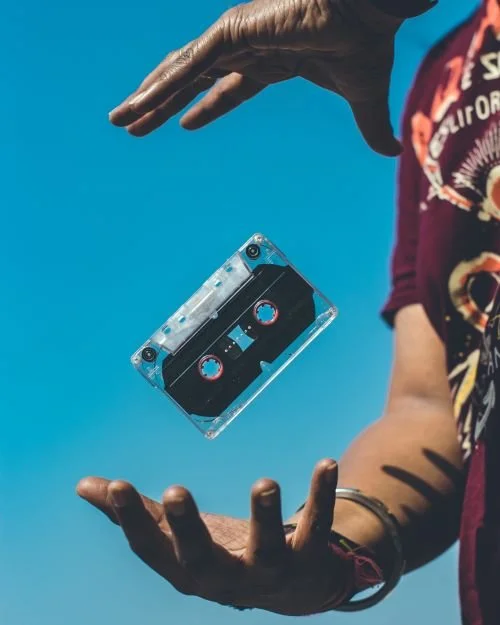FEATURE:
Fight for Your Rights
PHOTO CREDIT: Ashutosh Sonwani/Pexels
Is Strict and Expensive Music Licensing Hindering Filmmaking?
_________
SOME of the best…
PHOTO CREDIT: starline via freepik
and most iconic film moments involve music. Whether it is a song played in a scene or something on the soundtrack, we all have those standouts scenes that were aided and lifted by music. Filmmakers such as Quentin Tarantino are synonymous with their incorporation of music into films. Creating wonderful and eclectic soundtracks. I think the music can identify and define a film as much as anything else. More and more, I am reading about how various songs and artists were intended to be used in a film but they were not. Usually it comes down to one of two things. Either they could not get the permission to use that music, or the cost was just far too much. Artists, labels, and estates can charge hundred of thousands of pounds/dollars for a single song. As most films do not have a budget big enough to pay exorbitant amounts for music, less expensive options have to be considered. Here are some guidelines and clarifications when it comes to using music in films:
“To celebrate our Board Member matching campaign–which, your donation (and impact!) will be doubled through our Board Members and Friends Matching Challenge, available through this Thursday, September 29–we’re reposting our retrospective series The Fi Hall Of Fame featuring refreshed, expanded and updated versions of most popular blogs of all time. Special thanks to the original author of this piece, Lorena Alvarado.
Filmmakers often feel so attached to a song that it becomes a crucial and indispensable element of their story. A scene, or even an entire film, can revolve around a single piece of music. What many directors don’t realize is that the process of clearing that song can be very difficult and expensive. Brooke Wentz, the music supervisor behind Kings Point, Bully and Bill Cunningham New York cleared up some of the confusion and little-known realities of music licensing during a recent Film Independent education event.
PHOTO CREDIT: cottonbro studio/Pexels
The most important thing to know is that there are two rights to every song. There is the person who wrote the song (who holds the publisher rights, aka “sync” rights) and the person who recorded it (who holds the “master” rights). To use this piece of music you need permission from both entities. You can listen to a song like “All Along the Watchtower” by Jimi Hendrix, but you may not know that the writer is Bob Dylan. To determine who owns the rights to songs, the websites ascap.com and bmi.com are extremely helpful.
Once you’ve determined who owns the publishing and the master, you must contact them separately and ask for permission to use the song. This can get tricky when there are a lot of songwriters involved. Katy Perry’s song “California Gurls,” for instance, has five publishers. Therefore, if you wanted to clear this tune you would need approval from all five of the writers and on top of that you would need approval from Katy Perry. If one of them says no, then unfortunately you can’t use the song.
Here are Wentz’s top six secrets for music licensing:
For festival rights, most songs can be cleared at around $500 per side.
Meaning $500 for the publishers, $500 for the master. If you don’t have enough money in your budget to pay for all the rights up front, you can clear only the film festival rights and add an option to get all media rights up to two years later.
The fee is the same regardless of the duration of the cue.
If you use a song for five seconds or two minutes, it will cost you the same amount of money. The only exception to this is if the song is used over beginning or end credits.
PHOTO CREDIT: Karolina Grabowska/Pexels
The rate for a piece of music is negotiable!
Most filmmakers don’t know that they can offer a lower price, or if the artist likes the subject matter of the film, they might offer a better rate.
If you think a song is in the public domain, double check.
“I had a client who thought ‘My Sweet Lord’ was in the public domain,” Wentz explained. “I said ‘Nope, I’m pretty sure that’s a George Harrison song.’”
No response does not mean an approval.
It might be frustrating if they are not getting back to you, but you have to keep pushing. If you do not clear the rights for a song, you could receive a “cease and desist” letter from the rights holder which could incur fees.
PHOTO CREDIT: Stephan Müller/Pexels
If you’re doing a music doc, make sure you can secure the rights.
If the estate or the artist is not on board you will not be able to use the music. Many deceased musicians’ rights are owned by their spouse or ex-spouse—or both. Certain songs might never be clearable just because of inner conflicts that have nothing to do with you or your movie.
Filmmakers can get charged higher fees because they don’t know the numbers. That’s why it’s useful to have someone that knows about clearance to be the middleman. Brooke Wentz’s company, The Rights Workshop, helps filmmakers secure the appropriate rights for any budget.
Brooke recently worked on a film that got distribution at a festival and needed to expand the rights. She was shocked to discover that the director had licensed the songs himself and got charged five times what the fees should have been. Ouch!
Here some other stuff you should know:
Sync vs. Master agreements.
There are several different types of music-licensing agreements, but the two primary ones to worry about are sync and masteruse agreements– these agreements deal with pre-existing songs and sound recordings, not ones specifically composed for your film.
Sync refers to the actual composition/song—melody, lyrics and arrangement – as synchronized in timed relation with a motion picture. In almost all cases, a sync agreement is required in order to use a song in a film.
Take the example of U2’s cover of “Helter Skelter.” A filmmaker wishing to use this specific recording of the song will need first to seek a sync agreement from the copyright holder to the original Beatles composition in addition to a master recording agreement from U2’s record label”.
Maybe this is coming back to my own frustrations but, as someone currently working on a film concept where music is all over it, the logistics, realities, and expenses are daunting! I can appreciate how artists and labels want to ensure that the music being used in a film is paid for. A lot of films do really well at the box office, so it is only right that those that contribute music towards it get some of that cut. Most films do not have a huge budget to play with. So many films I see use snippets of songs or feature lesser-known artists. It can be good when smaller acts are featured, but I see similarities between getting rights to use music in films and getting clearance from artists to sample their music in original songs. There, it can be really expensive or problematic getting permission. I have said how this is hindering great music and the chance to use older songs and introduce them to the new generation. The same relates to film. A lot of the best film soundtracks ever are not packed with huge hits and well-known acts, but I don’t think there should be a price structure or the sort of restrictions there. Whether you are using a song by Madonna or a smaller band, I feel the costs should be based on the box office takings rather than this expensive and unreasonable price. Artists can choose not to have their songs used in films, and that is very much their decision. If they are fine with someone using their music, why can it be so expensive to use songs?
It is no exaggeration to say that hundred of thousands of pounds/dollars can be asked to use a song. As I said earlier, some of the most powerful and memorable moments in cinema have been supported by a great song. A musical drop that adds new life to something. An extra character or fresh emotion, I wonder whether there does need to be revision when it comes to pricing and permissions. Filmmaking is expensive and a challenge at the best of times, but also you cannot be expected to use a bunch of songs and pay a little amount. If you are putting together a film that wants to boast a great soundtrack featuring some classic artists, then costs will be incurred. There does seem to be this unreasonable gulf between relatively unknown artists and what they would charge, and the bigger acts. By doing a deal where a cut of the box office can be paid to artists (in addition to a smaller, flat fee), that would ensure that filmmakers could use music – and artists can set terms when it comes to how comfortable they are with its placement -, but they would also pay more to them if the film took a really big amount. From the start, when you are thinking about a soundtrack, having to really limit your ambitions and imagination is a real shame. I am in that boat at the moment, and it is quite a stressful thing! Music is such a universal and important aspect of life and culture. It can be arresting, emotion-changing and iconic when used in films. It can take a scene or shot to…
A who new level.





